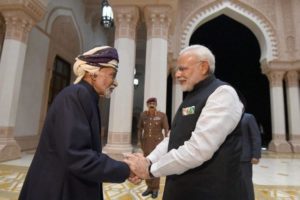
Indian Prime Minister Narendra Modi visited the Sultanate of Oman on 11-12 February, 2018, where he was hosted by H.M. Sultan Qaboos. Both leaders oversaw the signing of a landmark space cooperation agreement between Oman and India during the visit.
The Memorandum of Understand (MoU) was signed on behalf of the government of the Sultanate by Eng. Salim bin Abdullah Al Nu’aimi, Undersecretary of the Ministry of Transport and Communications, and India’s ambassador to Oman.
Eng. Salem bin Abdullah Al Nu’aimi said that the MoU provides for cooperation in the Omani use of India’s satellite navigation system, NAVIC, space sciences and exploration, sharing expertise between and exchange visits between space specialists, as well as the routine exchange of scientific data. The MoU also includes provisions for the joint organisation of courses, conferences, meetings, and symposia, and the promotion of cooperation in exploration and utilisation of outer space between the governments, the private sectors, and academic institutions in both countries.
Further, the Omani-Indian space cooperation MoU includes provisions for training and human resource development for use of space technologies and applications for economic development and other purposes.
Both governments issued a joint statement at the end of PM Modi’s visit, which stated that”
“The two sides expressed satisfaction over the current state of bilateral relations, especially the robust security and defence cooperation, and agreed to further expand their cooperation to new areas of mutual interest, including inter-alia, space, cyber security, energy security, renewable energy and food security etc., with a view to take the strategic partnership to a higher level. The two sides welcomed the signing of various agreements and MoUs during the visit, which would further consolidate and expand the ongoing bilateral cooperation between the two countries.”
The joint statement further noted that:
“The Omani side noted India’s globally recognized capabilities in research and development of space infrastructure, space technologies and space applications and thanked India for its offer to assist in development of Oman’s capabilities, including training, human resource development, for use of space technologies and applications for developmental and other purposes. The two sides expressed satisfaction over signing of the MoU on cooperation in space sector and called for its expeditious implementation.”
India and Oman have traditionally enjoyed close ties, given Oman’s geographical position on the Indian Ocean rim and its role as a crucial transit point for India’s energy needs imported from the Middle East. As a result, New Delhi has a stake in the successful economic development and security of Oman as part of its unofficial Look West diplomatic initiative, and space technology is likely to play a critical role in this.
Given Oman’s Indian Ocean coastline and energy transit role, Earth observation, communications, and positioning, navigation, and timing satellites will be used for monitoring pipelines, port and refinery installations, Omani borders (especially with neighbouring Yemen), and maritime domain awareness along the Omani coast and the trade routes between Oman and India’s West coast.
Similarly, Omani-Indian space cooperation can assist in diversifying the Omani economy by building human capacity in the nascent Omani space sector, using satellite applications in the Omani economy, and providing an additional layer of connectivity across Oman and the Western Indian Ocean.


